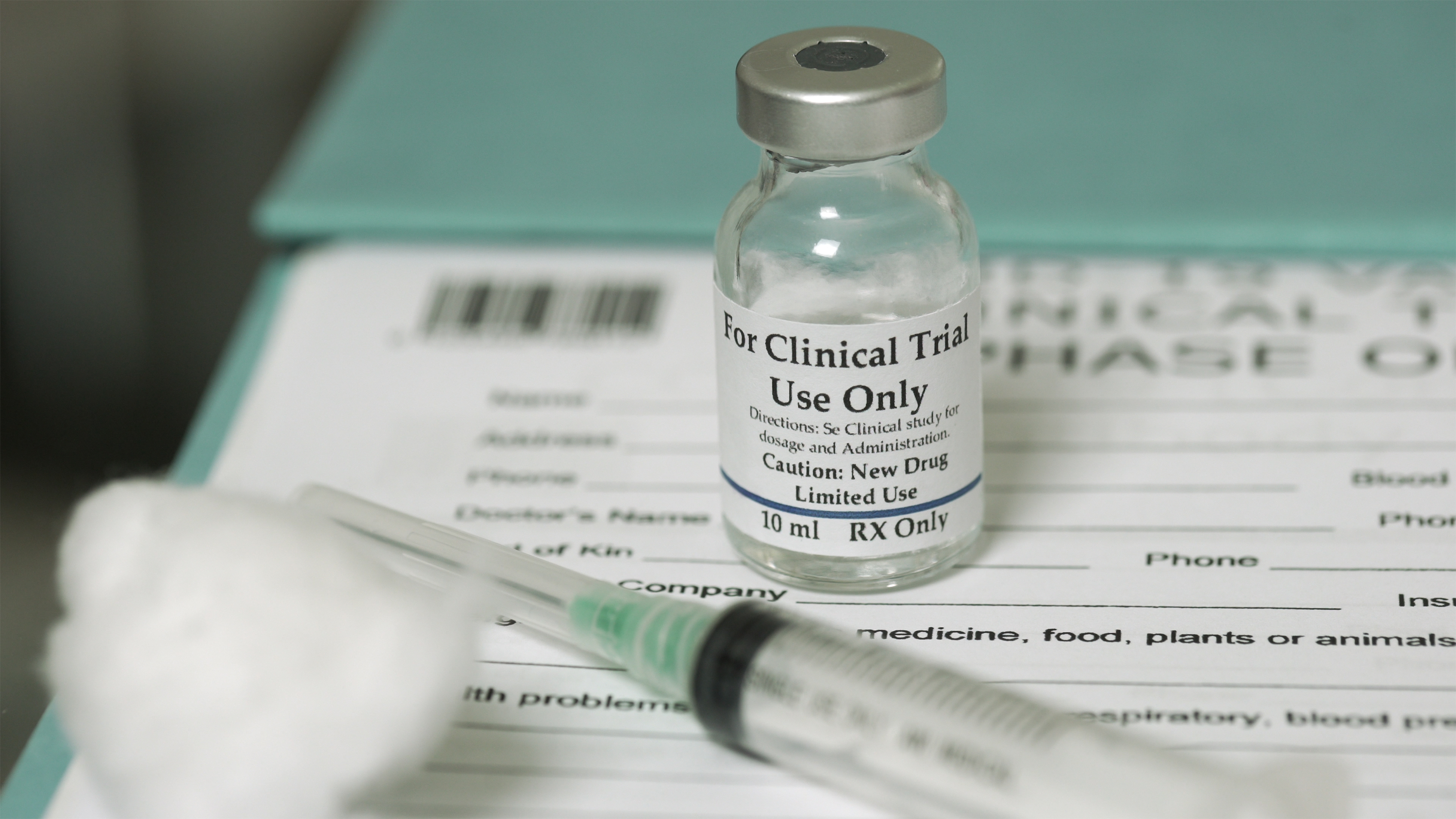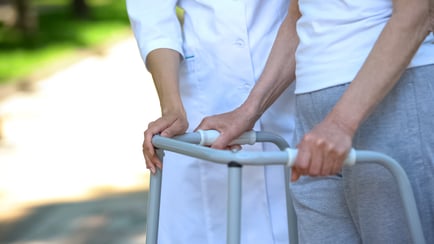A Good Blend of Reality and Optimism: What It’s Like Participating in Clinical Trials for Cancer
5 min read

When Deb* first received her cancer diagnosis, she didn’t think she would see her next birthday. And now, four months later, Deb hit another milestone she didn’t know if she’d make: she got to meet her brand new grandson for the first time.
The Value of Pain: A Warning Sign of Cancer
A former healthcare provider, Deb retired in 2018 after 38 years caring for others. In the spring of 2021, she had frequent bouts of body aches and exhaustion, but because she had battled COVID-19 a few months before she assumed she was suffering from “COVID long haul.” Then, crippling pain in her back forced her into her doctor’s office three separate times with no conclusive diagnosis. Finally, an MRI revealed cancer in her spine. And later, during radiofrequency ablation surgery to remove it, doctors also found cancer in her bones that had caused fractures to her pelvis and spine. A liquid biopsy provided Deb’s official diagnosis: stage 4 non-small cell lung adenocarcinoma that had metastasized throughout her body. For a non-smoker who lived a very healthy lifestyle, Deb was “blindsided” by her diagnosis.
 There are no routine screenings for lung cancer for non-smokers like Deb. That’s why pain is valuable, she said. “Pain is a signal of trouble, of a problem. I had no symptoms of lung cancer, nothing I could pick up on. It was that severe, progressive pain that got me in to get an MRI.”
There are no routine screenings for lung cancer for non-smokers like Deb. That’s why pain is valuable, she said. “Pain is a signal of trouble, of a problem. I had no symptoms of lung cancer, nothing I could pick up on. It was that severe, progressive pain that got me in to get an MRI.”
The cancer in her bones – and the accompanying pain – escalated so rapidly that Deb completely lost the ability to walk unaided over the course of 10 days.
Finding the Best Cancer Care
Deb wasn’t satisfied with the first oncologist she was referred to, both in her interactions with her and her professional experience with the type of cancer Deb faced. “I think it's important for people to learn how to advocate for themselves and find absolutely the best treatment for their specific diagnosis,” Deb says.
“In my work, especially when I did home health care for 12 years, I was the foremost advocate for my patients to get the best care that they could get,” Deb said. “And here I am in this situation with this awful diagnosis, and I felt like I wasn’t getting the best care from my first oncologist. I wasn’t understood and my questions were unheard. I advocated for others all these years and (I realized that) now it’s my turn.”
 Deb and her daughter began researching Colorado cancer doctors and independently decided on Dr. Robert Jotte at Rocky Mountain Cancer Centers (RMCC). They were impressed by his work as a cancer researcher and a practicing oncologist with a specialty in lung cancer.
Deb and her daughter began researching Colorado cancer doctors and independently decided on Dr. Robert Jotte at Rocky Mountain Cancer Centers (RMCC). They were impressed by his work as a cancer researcher and a practicing oncologist with a specialty in lung cancer.
“What I got at RMCC was someone with a passion,” she said. “Dr. Jotte and his staff had all the records in front of him on my first visit. When I walked in the door at RMCC they knew exactly what to do with me.”
What It's Like Participating in Clinical Trials for Targeted Cancer Treatment
The liquid biopsy revealed the type of cancer infecting Deb as well as a specific gene mutation that could be targeted to halt its growth. Additionally, when she met with Dr. Jotte in April, she was given the option to participate in a clinical trial for a new cancer drug. It would be a five-year randomized trial but – at the minimum – she would receive the FDA-approved standard of care treatment or one of two experimental courses of treatment.
“The new treatment targets a mutation to prevent the cancer from taking over my healthy cells, unlike chemo, which kills everything, good and bad,” Deb said.
Choosing to participate in clinical trials was not a difficult decision for Deb. To get into the trial as fast as possible, “the next step was paperwork, lots of paperwork,” she said.
Participating in a clinical trial is an intensive process requiring numerous tests to be completed within a deadline. To help accomplish this intimidating task, RMCC assigns every patient who wants to participate in a clinical trial a research nurse to navigate them through all the tests and get them done in time.
“The moment my nurse (Bethany) emailed me, I got phone notifications,” she said. “She became my best friend that month. The level of care, the respect as a human being, has been exceptional (at RMCC). Anything I need, any question I’ve had, I get a response within a few hours; the communication is continuous.”
After barely making the deadline, Deb was accepted to participate in the clinical trial, and the next day she began treatment. Once a month, she goes to RMCC to pick up her medication for the week. At that time, she also receives tests that gauge both how well she’s tolerating the medication and whether or not it’s effective at stopping cancer growth. The trial also regularly requires additional tests such as CT scans. “They are watching you like a hawk,” Deb said. Because she’s participating in a clinical trial, the cost of all her medications and tests are covered.
This routine will continue throughout the five-year trial – as long as the treatment appears successful. At any point, she has the option to change treatments if the medication she was assigned to is not effective at stopping cancer growth.
In only four short months since Deb started the clinical trial, she’s made incredible progress. She regained her ability to walk and has returned to activities of daily life without pain. With her official progress report reading “stable with improvement” and her last two CT scans showing the target lesion decreasing in size, Deb is thrilled.
Though the application process to participate in a clinical cancer trial was stressful, Deb believes it was absolutely the best option for her and definitely worth the effort. “I know that in clinical trials there’s hope, more hope (than the standard treatment),” she said.
Beating Cancer Isn't Just About Clinical Trials, It's About Hope
“Hope is very important,” Deb said. “It brings greater meaning to life. To hope and believe the best outcome possible and not resign ourselves to what we see or feel but believing in something more.”
A mother of two and grandmother of three, Deb has much to be hopeful about, including an incredible husband, a supportive “church family,” and “many prayers said on my behalf.”
A self-described “woman of great faith,” Deb believes she “got the trial option that God wanted me to be in.”
In fact, one of the trial nurses told her, “you’ve got a good blend of reality and optimism.”
Since the age of 16, one of Deb’s passions has been inspirational singing, performing with her church choir. And even lung cancer “has not been able to silence the expression of my voice in song,” she said. She quotes a favorite Psalm (59:16): "But I will sing of your strength. Yes, I will sing aloud of your loving kindness in the morning. For you have been my high tower, a refuge in the day of my distress."
*This patient asked to remain anonymous so that she could share with complete honesty and has been given a fictitious name.
While participating in clinical trials for cancer, drugs can be a life-saving opportunity, but it often requires a long-term commitment and additional obligations. Find out more about participating in clinical trials and cancer research.